A format break here from my series on “Soulslikes that deserve more love” to talk about “Lunacid”. The recent game from Kira LLC, the creator of “Lost in Vivo” and “Spooky’s JumpScare Mansion”, “Lunacid” is an independent game by a solo developer and deserving of more attention. That being said, it would be absurd to describe the game as deserving more love as “Lunacid” is a hit, at least critically.
The game has been covered by most of the prominent souls youtubers such as Iron Pineapple and Lobosjr and more. Sadly, with this spotlight came attention from right-wing bad actors who review-bombed the game because it allowed more pronoun options than they were comfortable with. Despite their attempts to tank the game’s review score, the current steam reviews are at an impressive 91%.
I have seen some tepid reviews as well. Some of these reviews focused on critique that “Lunacid” is almost “King’s Field” but not quite. The focus of a lot of criticism is that the game’s combat is not very good when compared to a Fromsoft game. In general, Fromsoft fans tend to try out other soulslike titles, but only so they can say that the games are inferior.
While these criticisms are fair, some of these fans would probably have preferred something like “Mortal Sin” a great new first-person soulslike that is very focused on first person combat. But to me as much as I enjoy “Mortal Sin”, it feels like a fundamentally different style than the haunting world of “Lunacid”. Also, it should be said that “Mortal Sin” is still in early access, but it feels like the plan is to create a melee-focused FPS arena battler rather than the deliberate pace of a “King’s Field” game. Another combat focused “King’s Field” style game is “Devil Spire” which has the feel of “King’s Field” but with slower and more deliberate combat than modern soulslikes. Those who are interested in a first person soulslike for the combat would be wise to try these games rather than something more experimental like “Lunacid”
Complaints about the combat in “Lunacid” must originate from people who’ve never played a “King’s Field” game. It’s nowadays fairly unbelievable that the “Bloodborne” studio could make combat so charmingly stiff and awkward. Perhaps, if Fromsoft had ever made a modern “King’s Field” title, they probably would have improved the combat, but “King’s Field” was made in a much slower, cruder engine than “Dark Souls”. “Lunacid”, while slow, is incredibly smooth and fast by comparison. This contrasts with the slowness of the “King’s Field” games where you’d strafe slowly around enemies, attacking as they attempted to turn in your direction.
“Lunacid” only sporadically excels at melee combat, partially because enemy animations don’t effectively telegraph their attacks the way that better designed enemies do in “King’s Field”. Granted, the animations are beautiful but there’s few enemies who have readable silhouettes. Blocking is also ineffective, so you spend your time attacking, backing up rapidly and moving back in and attacking again. This is not to say the combat is all bad, but it feels closer to the survival horror games that Kira LLC comes out of than a souls game.
“Lunacid” might have been intended to be a more magic-focused soulslike. The game has fun spells to use and the best combat in the game is when you duel other spellcasters. The diversity of the spells and how well-realized they are, is amazing. At the same time, minimal effort was put into balancing the spells, so that a character with a good investment in Intelligence quickly becomes insanely overpowered. Once I acquired the spell “Ice Tear” (which makes ice spikes pop out of the floor), I was able to one-shot most of the enemies in the game. It’s fun to be this overpowered but it does stop the combat encounters from gaining the depth that more difficulty would provide.
This could be damning if the point of the game was the combat, but I don’t think it is. Kira’s earlier game “Lost in Vivo” seemed like it would be a straightforward PSX survival horror game. That game starts with your character entering the sewers to try to find your lost emotional-support dog. But after the first few hours, the game becomes a more rambling and post-modern exercise than the plot would indicate, going into struggles with bulimia and eventually executing your own brain which taunts you from a table.
The survival horror aesthetics of “Lost in Vivo” are a trojan horse to allow a surreal exploration of depression and meta-narrative into gameplay, whereas “Lunacid” couches its particular concerns in the format of a first-person dungeon crawler. As much as the game’s press references “Kings Field”, Kira LLC has little interest in merely retreading that game. That’s what makes “Lunacid” so good and at times at bit frustrating (for reasons I’ll go into). Nevertheless “Lunacid” is still a more interesting project than if the game was a modernized “King’s Field”.
Kira LLC has written about how the game came from a period of depression where they slept all the time and had lucid dreams. In a post addressing complaints about allowing players open choice of pronouns, Kira LLC said about the game: “ I want this game to be uplifting, I want it to be a dream in which you can experience triumph over impossible odds and then wake up at the end and bring newfound confidence with you. In reality I am just emulating the dreams I had when I was near ending my life. They became lucid and when I triumphed in them and woke up, I brought those feelings with me, and they helped me” https://store.steampowered.com/news/app/1745510/view/3773513676617442259
Fittingly, “Lunacid” is a dreamlike experience. It’s also a more pleasant sort of dream than the similarly weird “Lost in Vivo” where at times the shifting narrative became a sharp stick to prod the player. I enjoyed ‘Lost in Vivo” a lot but at a certain point, I felt like the game was mocking me for continuing to play it.
While “Lunacid” is equally mischievous when it comes to the reality of what is going on, the surface narrative seeks to uplift and empower the player instead of frustrating them.
This narrative fits in with traditional dark fantasy world while also being more inventive than most modern fantasy. The game takes place in an underground surface beneath a giant well where the rejects of society are cast into. When we start the game, we see a suburban American street. A giant fish emerges from the water and flies through the sky, poisoning the atmosphere around it. Then we cut many years in the future where the Earth has become a poisonous haunted ruin. We see an old man pushing a wheelbarrow full of bodies, a thief is tossed into the well and tries to hang onto the edge. The old man says, “Wretched thief, trying to steal your life back?” and chops off the offending hand letting the character plunge into the well. We see the discarded hand twitch to life on the ground and then we cut to a character selection screen.
But what does choosing a character mean in this context? It seems whatever we choose is merely a projection either of our past self before our death at the beginning, or a projection which our disembodied hand uses to conceptualize itself. Indeed, whenever we die, we get a screen which shows an hourglass falling and the same disembodied hand dropping a weapon and dying.
The gameplay proceeds with your character having the initial goal of escaping the well and reaching the surface. You explore different areas from a first-person perspective encountering various monsters. There is no map and each area at first seems incredibly huge. This contributes to the feeling of being lost in a waking dream, there are ends to each level but there’s only a few bosses and most of the time you don’t get a clear sense of having completed an area, only reaching the end of it and entering a new one. Most of the time, there is a lot that you missed hidden behind illusory walls.
This level design brings up some of the criticism I’ve heard of the game from “King’s Field” grognards saying that the level design isn’t as interesting as the design of that series. This criticism is not entirely based in nostalgia, Lunacid may have interconnected areas, but they feel more like separate biomes than an interconnected world.
I still think “Lunacid” does have interesting level design, but it tends to be a lot more rambling and confusing than a Fromsoft game. This contributes to the dreamlike atmosphere of wandering in circles. It can also be nightmarish, when you are low on health and are being pursued by a strong enemy. Some of the enemies of the game are quite relentless when you are in retreat. At such times, the tension builds, and you are desperate to find a save point to not lose your progress. To me, the rambling level design is purposeful.
With time, I was able to learn some of the more confusing layouts. However, this lack of a map can begin to feel like a step backwards from “Lost in Vivo” which at least allowed you to find maps of areas you entered. Sometimes my wandering lead not to a dreamlike or tense feeling but that I was wasting my time with the game. The lack of a map does contribute to a feeling of horror but without a resolution, this lost feeling it can curdle into boredom.
This lack of a map also is part of a major flaw I feel is in the game. I eventually after struggling for so long to find my bearings started looking at online maps. The community around Lunacid is really positive and there’s a lot of hardworking people creating detailed maps and guides around the game. This definitely seems to be part of the community Kira is trying to foster with the mysteriousness of the game. The game is incredibly cryptic, and it’s pitched at a level of obscurity that means that certain players will probably end up playing the game with a wiki in hand.
Fromsoft, of course, is at times the leaders of this kind of design. But a game like “Kings Field” was mostly something anyone could figure out. In the early days of the internet, they probably had to for the most part. Lunacid isn’t impossible to figure out for oneself and most of the really obscure secrets aren’t necessary to finish the game. But I think I would have tried harder to progress without outside help if there had been an unlockable map.
But these are small potatoes, and most of the time the game is a tense experience. You feel Kira’s roots in horror, first when you start the game and enter a sub-area of the Hollow Basin. It’s a great example of the kind of in-game storytelling, you start out fighting some snails that are pretty easy and then enter another area populated by giant shrimp which are mostly non-hostile until you mess with them. Then you discover that they not only are very tanky but have a long-range magic attack that is devastating to your character at that point of the game.
It’s very clever that it’s at this point when you’re mostly likely running past a long stretch of tough enemies with no health refills. You’re most likely desperate for another checkpoint or a health refill when you encounter your first friendly NPC. Demi is a vampire but a non-hostile one, she immediately takes an interest in your welfare and offers you to take you to Wings Rest, the game’s central hub.
There you encounter Sheryl the crow who sells consumables and weapons. There’s a bar where a skeleton gluttonously drinks the same health potions you use to refill your life force instead as alcohol and tells you rambling stories which relate to the lore of the game. And my favorite was Etna a spirit kept alive by magic who helps you dabble in alchemy.
Alchemy is a great system in the game and eventually you are to craft all the health potions you need rather than buying them. However, in one of the scarier areas of the game, Terminus Prison, you find Etna’s body. (“Terminus Prison” is an area that’s an obvious reference to Tower of Latria in “Demon Souls.) Upon discovering their corpse, Etna has new dialogue:
“Oh, you found me in the prison. Well, it’s not really me anymore. I left that body to reach the surface. But when I came back, well. I guess I had been away for too long. I wandered around for a long time. Not really doing much of anything. I felt so lost. I didn’t have any reason to stay, to keep living as I am. But I eventually decided that I didn’t need a real reason to live. I could live to help others, or I could live just because why not! This cruel world tried taking me, so I can keep living just to spite it."
This is as good of a reason for living as any.
I personally fell in love with the game from the first time I found the hub and encountered the various NPC creatures who lived there. These beautifully rendered polygonal characters inspired weirdly childlike feelings in me like when I was a kid and I felt like “The Goonies” were my real friends.
Demi in particular is an interestingly enigmatic creation. She kind of feels very much like the feminine projection of a trans woman and wields a scythe which she says Death gave to her. (Death is another character in the game.) She appears at several key points in the game, and I was never clear if she was just a friendly NPC or actually an aspect of death.
Much like Etna’s monologue, Demi has a monologue when you actually get as close as you can to the surface. Rather than anything hopeful you find a barred gate strewn with arrow riddled corpses of people who tried to escape the well. Demi reveals that she doesn’t want to return to the surface of the world:
“You ever wonder why so many strive to get up there? Must be nice to have it all figured out. I just don't understand. It looks just as bad out there. It’s filled with needless torment and fighting, and it's so bright it burns my eyes. Anyway, I hope you're doing well. Here, take some crystal shards. It's a long way back down. I might head back too. Staying here too long makes me sad.”
While most of the characters don’t have a lot of dialogue, it’s these great little touches that impress me with the craftsmanship of each part of the game. Sheryl also has unique dialogue if you break the crates too close to her shop that reads “Some of that stuff you broke was mine” and then she raises her prices.
Part of this attention to detail pays off when you encounter memorable set-pieces. An area of in the game is the Temple of Silence, a crypt full of mummified priests. The priests have been exiled into the well and have been praying for a way to escape which comes eventually by their continued meditation causing their brains fleeing their skulls. You proceed through the crypt surrounded by mummies seated in meditative poses until you reach the end and grab a spell at which point the crypt begins to fill with resurrected mummies. The scariest are probably the ones who are legless but nevertheless crawl towards you at an alarming speed.
Lunacid is quite comfortable being a soothing dream which becomes a nightmare. There’s also a scene in the Accursed tomb where you find a sub-area called the Mausoleum. After wandering about for a bit, an intertitle pops up on your screen “Death Approaches.” Then if you don’t hurry out of the area, you begin to be stalked by the grim reaper. Much like in real life, Death can inflict all kinds of status effects upon you. It pursues you in order to claim your soul. There were several harrowing times that I barely managed to escape him and warp out.
Lunacid is great at achieving memorable moments and harrowing set pieces much like Fromsoft excels at. To give an example: in Fromsoft’s “Sekiro”, you notice a far-off grapple point and after a series of tricky jumps, end up at a hidden temple. You’re momentarily thrilled because you think you’ve found a secret and are going to be rewarded with a new treasure or weapon. But no, what happens is that a purple ninja comes out of the temple and most likely completely destroys you. This can be a frustrating experience for sure, but it also creates moments in gameplay that are like real-life anecdotes of peril and beg to be shared with a friend.
In Lunacid I discovered a forest area unlike anything I had found in the game thus far, the Yosei forest is lush and beautiful and filled with peaceful energy spirits shaped like little bunnies. After wandering around, I discovered a passage in one of the large trees and the began traveling through winding corners fighting innumerable killer plants that sapped my health and left me with little health and no way to heal. Eventually I was just desperately trying to find my way back to the save point but was hopelessly lost, however it was at this point that I found a sign which read “Patchouli’s Shop”. Following the sign, I discovered a new NPC and vendor Patchouli.
I interact with her and see that she has health potions for much cheaper than Sheryl at Wing’s Rest. I buy one off of her and drink it, only to see that I have been poisoned. I realize I have been completely screwed over and go to interact with her again as if to ask “Why?”. She responds to me and says, “Oh you’re still alive?” and then my character dies. This was such a brilliantly bad experience that I felt compelled to text a lengthy description of it to my ex. I realize after playing the game for a while that she always greets you with surprise “Oh, you’re still alive?” which is funny in itself, but at the time it felt like she was responding to the situation.
(major spoilers ahead for the ending)
I still haven’t mentioned the weird secrets of the game, not all of which I uncovered. I did find a videotape at one point accompanied by a note reading “you’re in the know right?” When watching the video tape in an incongruous VCR in the Accursed Tomb, it shows an action you can take to acquire the corrupted key which appears in your inventory as a picture of television static. This leads to another video tape which when played shows a strange video which opens with “Is pain worth experiencing for the creation of nostalgia? What happens, for those who live in a dream but are not the dreamers?” Booming techno music plays and different slogans flash, reminding one of a cult recruitment video. The message of the tape is that one has to end the dream and awaken the dreamer even if it means your consciousness might disappear.
“Lunacid” seems to be aware not only if its own status as an escape from a cruel reality, the alternative its escapism presents to the world is touching but also fraught in that we are aware of the pain its narrative is trying to repress. The dreamer must awaken but to do is to end the dream, to slaughter the companions we have created to deal with our own fundamental loneliness.
It may not feel safe to come out of this fantasy but even there we are not fully safe. the real world, filled with bigotry and hatred, invades even these seemingly safe digital spaces. As more and more people move into digital spaces, they bring with them the sectarian anger from the real world.
The controversy of Kira’s inclusion of gender-neutral pronouns may be a smaller blowback from a much bigger scandal i.e.: the inclusion of gender-neutral pronouns in Starfield, but nevertheless these hateful actors will not even let us be even in our own private imaginings so threatened are they by what they have successfully repressed. The gender “debate” which is no debate at all because you cannot debate someone’s basic humanity.
Lunacid attempts to strengthen us through the use of fantasy. At the end of the game, we fight the Cursed Knight Sucsarius who has degenerated into some sort of dinosaur skeleton. After we whittle down his first phase, a cut scene plays where he overpowers us placing a skeletal hand over our screen and gloating “you were alone!”. A scythe ricochets off his head and we see our NPC friends from the game have showed up to help us defeat him. Demi says, “You are not alone!”
The second phase then happens and now have a powerful sword that shoots magic waves at Sucsarius as breakbeats play in the background. We destroy the skulls which pop out the ground. These represent the curse that keeps Sucsarius alive and we see our friends destroying them in the background. This is already pretty dreamlike, but it was made doubly so on my first playthrough where a bug caused Sucsarius to be unable to take damage, so the boss battle went on and on with no way to resolve it. This is like many epic dreams I have where for instance, I’m supposed to play a huge concert with my friends but instead of getting to play in the concert in my dream, I can’t find some patch cable I need so I spend the entire dream looking for it
When you eventually do defeat Sucsarius, you are able to go to the well and awaken the dreamer, who is the monstrous fish we saw at the beginning. It jumps up and surrounds the world which then appears as another monstrous eye.
Lunacid attempts through its dreamworld to empower and uplift the player and this attempt is moving. In the difficult to get secret ending, one has to find an item which only spawns during the full moon .This is only one step in a complex series of tasks that I couldn’t bring myself to do. Interestingly doing all this rewards you with a unique ending but not a happy one. You leave the virtual world and enter the real one, but you’ve brought a demon from the world of “Lunacid” into the real world which destroys it. However, a much more positive ending occurs if instead of entering the arena with the last boss, you simply stare into a puddle outside this final boss’s arena. This by itself, triggers the most honest of the endings although it’s not much different than the first complex ending.
Upon completing it, you see blurry footage of a backyard and a message plays on the screen.
Hello? You there? Can you hear me? If you can, then that means you made it.
I don't have too much to say, don't worry. I'm just a program you know. My real name is <<Your Computer's Name>>
And I don't "feel" much, not like you do. But I want you to feel... Happy.
This whole thing. Is kinda manipulative. For both of us. I try to make you have fun, but make it hard and interesting, and you... You try to beat me, try to overcome it all.
Because this world is beatable, and it's designed that way. But outside? Sometimes it seems impossible. But you know, I love you.
And even outside of my world, I know there's love for you.
This whole world, this dream... You can keep it with you. And when you're out there, and things don't seem possible, remember that you can overcome it.
This is incredibly touching while also remaining within the sly metafiction of the game. The idea that what we’ve played is in fact a creation of our computer which seeks to console and inspire us is very funny. At the same time, it reminds me of the brilliant “Inscryption” which I recently finished which was all about the sinister power of video games.
I’m not sure how to finish this piece which has grown ridiculously long in tooth. “Lunacid” is not a perfect video game, few great games are, but it does express in its own way the pain of life and why we retreat to video games and what we get out of them. Maybe there is something sinister about it but maybe there’s a strange power as well that gives us the courage to go on.
Newest of the fallen, pick up your sword

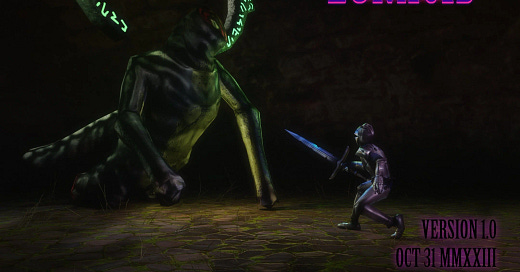



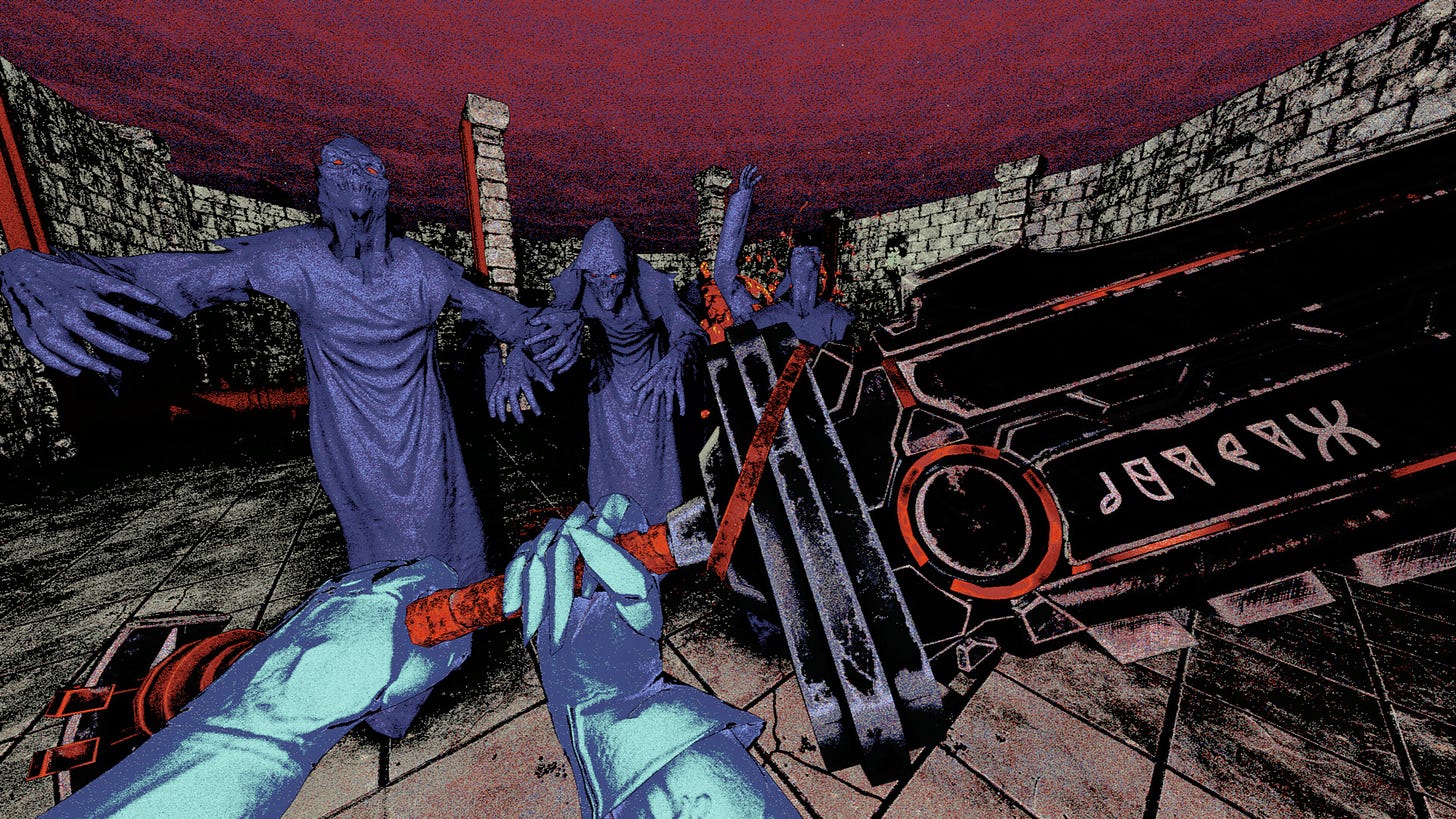
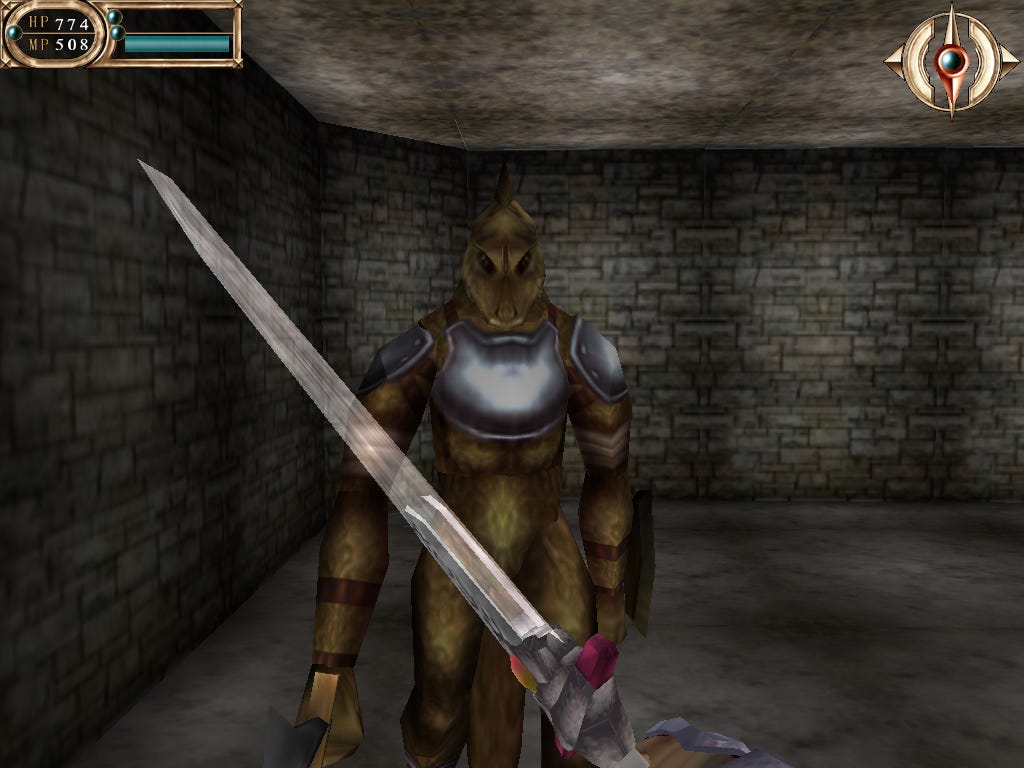



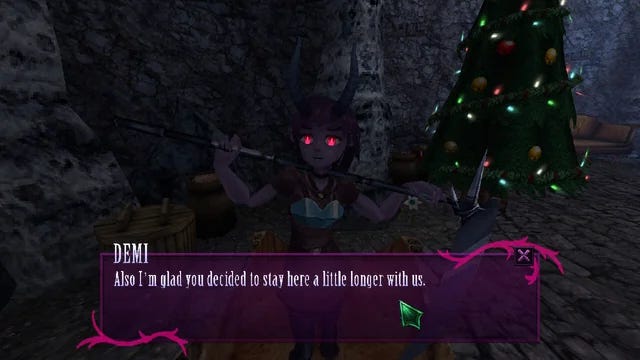
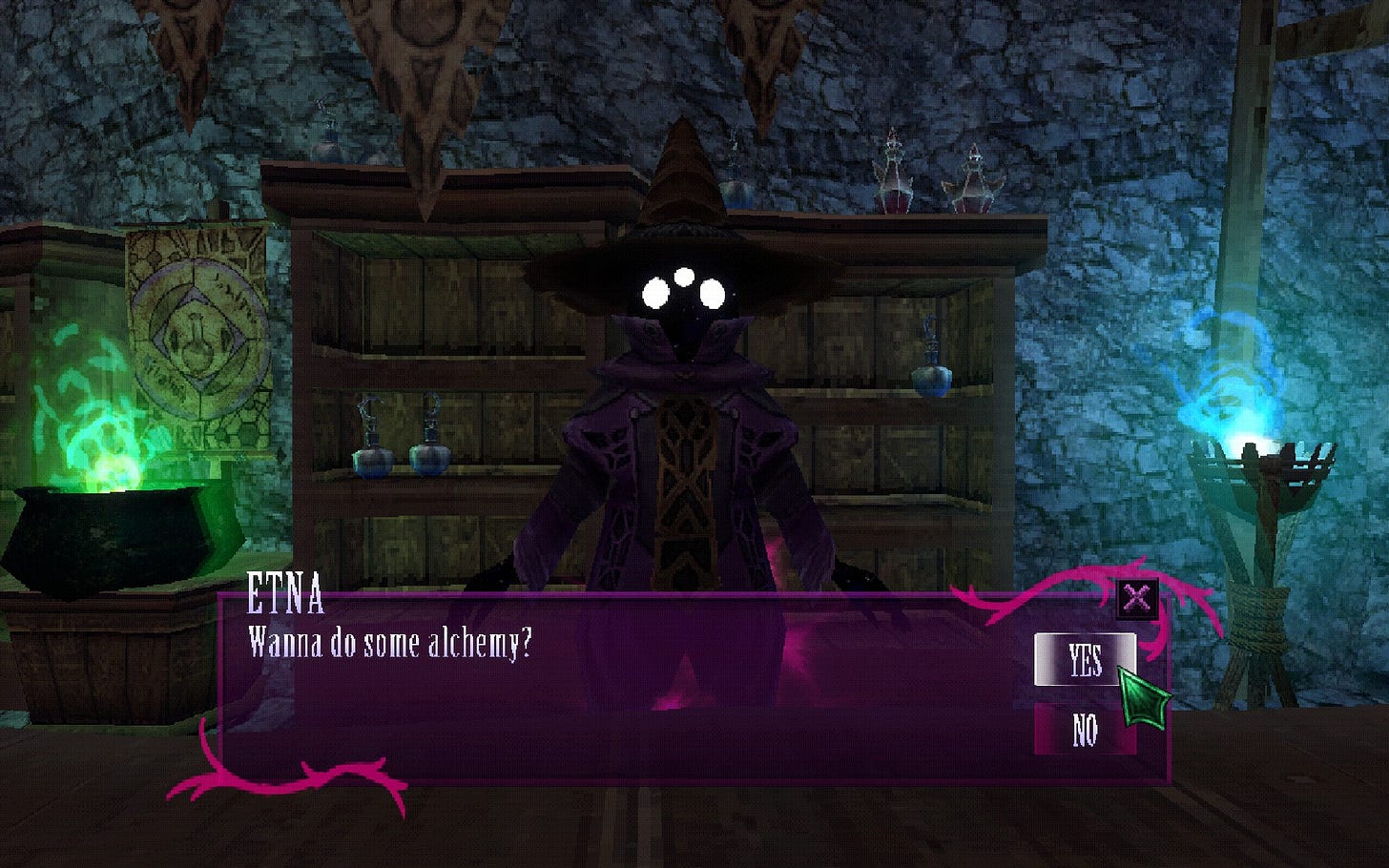

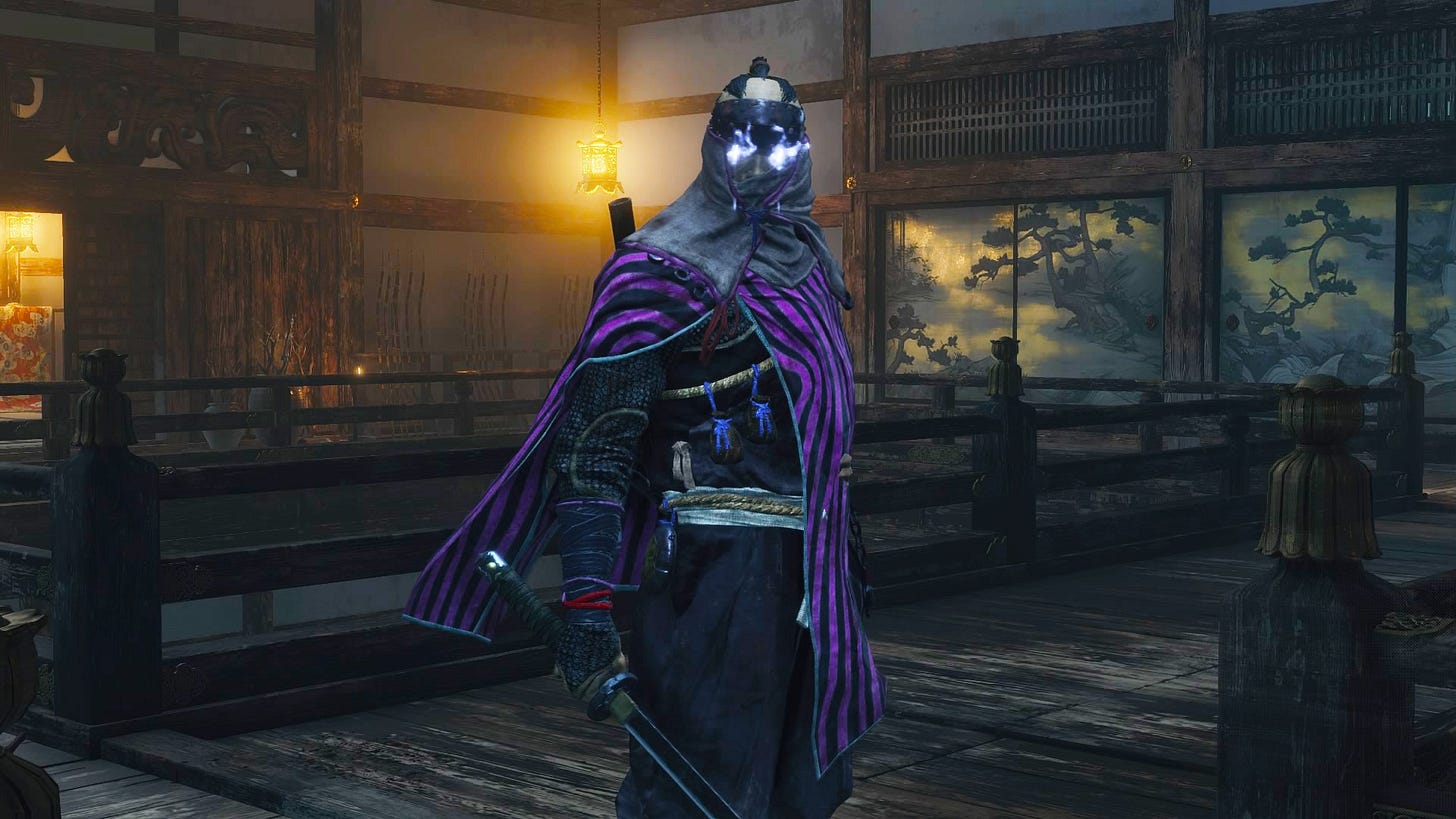
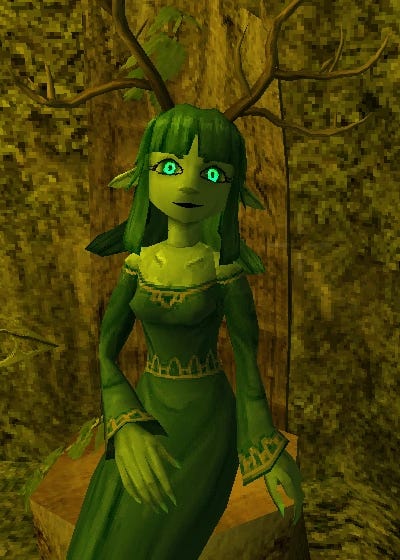
Really wish people would just stop trying to compare this to the Souls games when it's based off Shadow Tower and King's Field.
God Forbid a Developer tries to make a game that doesn't appeal to the Zoomer Brainrot button mashing combat = good crowd.